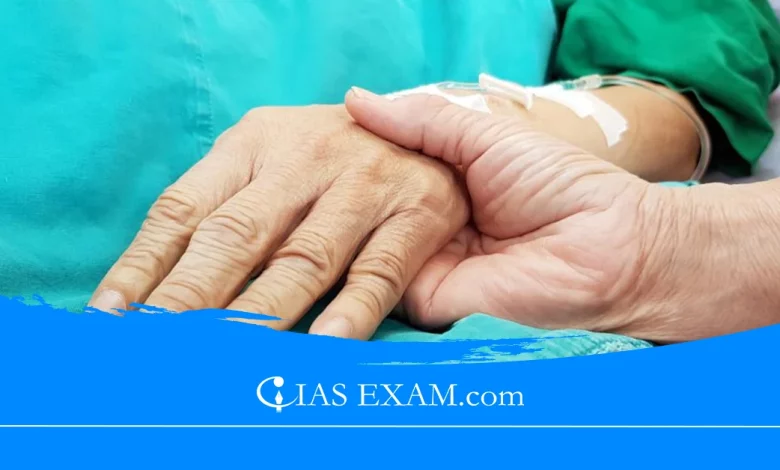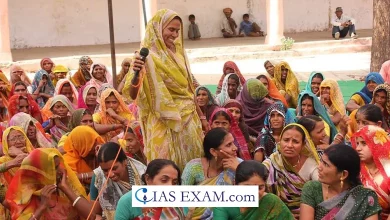‘Help to Die’/End of life’ Bill
Syllabus - International Relations [GS Paper-2]

Context
French President Emmanuel Macron has announced legislation, ‘Help to Die’/End of life’ bill, in order to allow eligible patients to administer a lethal substance under ‘precise conditions’.
About
- It is a move that is aimed at alleviating patients suffering from incurable illnesses, thereby allowing people to ‘die at will’.
- This bill could add France to the listing of European countries that legally allow euthanasia for the terminally ill.
- Belgium, the Netherlands and Luxembourg, Germany and Spain also authorised assisted demise.
‘Active assistance dying’ regulation of France
- Under active-assistance dying’, a lethal substance can be prescribed to the patient, who can administer it themselves or with the assistance of a third party if they are physically unable to achieve this.
- The third party can be a volunteer, the physician, or the nurse treating the affected person, in keeping with the text. The substance may be administered at the affected person’s home, in care homes for the elderly or in care centres.
- The medical group may have 15 days to respond to a patient’s request, and most effective after the approval will help to die’ be valid for 3 months, at some point of which the affected person can retract at any second.
- Minors and sufferers affected by Alzheimer’s disorder and different psychiatric or neurodegenerative situations will not be eligible under the right-to-die bill as the condition may hamper their decision-making abilities.
What is Euthanasia?
- Euthanasia is the act of intentionally ending a person’s life to eliminate pain or suffering. Ethicists differentiate between active and passive euthanasia.
Status of Euthanasia in India
- It differs between active and passive forms.
- Passive Euthanasia (withdrawing life support): This is legal in restricted instances. The 2018 Supreme Court judgement in the Common Cause (A Regd. Society) vs. Union of India and Anr, allowed passive euthanasia for terminally unwell or completely vegetative patients with a legitimate living will.
- The court similarly eased norms for this process in January 2023.
- Active Euthanasia (administering lethal medicinal drugs): This remains illegal in India. The Indian Penal Code criminalizes each inflicting death (homicide) and assisting suicide.
Arguments in Favour of Euthanasia
- End of Pain: Euthanasia gives a manner to alleviate the intolerably extreme pain and suffering of a person. It relieves the terminally ill people from lingering death.
- Respecting Person’s Choice: The essence of human life is to stay dignified life and to force the individual to live in an undignified manner is against the person’s preference. Thus, it expresses the selection of someone that is a fundamental principle.
- Treatment for others: In many developing and underdeveloped countries like India, there may be a lack of funds. There is a scarcity of health center space. So, the energy of doctors and health facility beds may be used for those persons whose life may be saved in place of persevering with the life of those who want to die.
- Dignified Death: Article 21 of the Indian Constitution actually offers for residing with dignity. An individual has a right to live a life with at least minimal dignity and if that standard is falling below that minimum level then a person should be given a right to end his life.
- Addressing Mental Agony: The reason behind this is to assist rather than damage. It not only relieves the insufferable pain of an affected person however also relieves the loved ones of an affected person from the intellectual agony.
Arguments Against
- Medical Ethics: Medical ethics call for nursing, caregiving and restoration and not ending the life of the patient.
- In the present time, scientific technology is advancing at an exquisite tempo making even the maximum incurable illnesses curable these days.
- Moral Wrong: Taking a life is morally and ethically incorrect. The cost of life can by no means be undermined.
- Vulnerable people are more susceptible to it: Vulnerable people might feel obliged to choose euthanasia as they will see themselves as a burden to society.
- Suicide v/s Euthanasia: When suicide isn’t always allowed then euthanasia must also not be allowed. A character commits suicide while he is going into a state of melancholy and has no desire from the life. Similar is the situation when someone asks for euthanasia.
Legal Provisions in India and Related Court Judgements
- Section 306 of the I.P.C.: Every act of aiding and abetting the commission of suicide are punished under the section 306 of the Indian Penal Code.
- State of Maharashtra v. Maruti Shripati Dubal, 1987: It was held in this example by the Bombay High Court that ‘right to life’ also consists of ‘right to die’ and Section 309 (punishes attempt to commit suicide) turned into struck down.
- The court surely stated in this case that the right to die is not unnatural and also cited many instances in which someone may also need to end his life.
- Gian Kaur v. State of Punjab, 1996: It was held by the five-judge bench of the Supreme Court that the “right to life” assured by Article 21 of the Constitution does not encompass the “right to die”.
- The court cited in this case that Article 21 only ensures right to life and personal liberty and in no case can the right to die be protected in it. In India, like almost in different countries, euthanasia has no legal aspect.
- Naresh Marotrao Sakhre And Another vs Union Of India And Others, 1994: Distinguishing euthanasia from suicide,court docket discovered that, “suicide by its nature is an act of self-killing or self-destruction, an act of terminating one’s very own act and with out the useful resource or assistance of any other human.
- Mercy killing is not anything but murder, regardless of the circumstances in which it’s far affected. Unless it is especially common it can’t be an offense. Indian Penal Code in addition punishes not only abetment of homicide, however also abetment of suicide.
Way Forward
- Euthanasia challenges conventional perspectives on dying and medicinal drugs. Public discourse that considers religious, moral, and cultural views is essential.
- If euthanasia or PAS is legalized, strict guidelines and safeguards are had to prevent abuse or coercion.
- Ensuring access to quality palliative care, which focuses on comfort and symptom relief, should be a priority alongside any discussion of euthanasia.
Source: The DTE
UPSC Prelims Practice Question
Q.Right to Privacy is protected as an intrinsic part of Right to Life and Personal Liberty. Which of the following in the Constitution of India correctly and appropriately imply the above statement? (2018)
a. Article 14 and the provisions under the 42nd Amendment to the Constitution.
b. Article 17 and the Directive Principles of State Policy in Part IV.
c. Article 21 and the freedoms guaranteed in Part III.
d. Article 24 and the provisions under the 44th Amendment to the Constitution.
Ans – “c”





.png)



